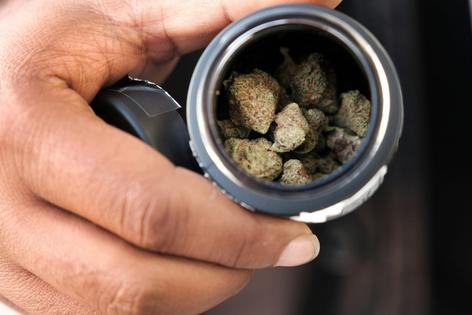As Pennsylvania inches toward legalizing recreational cannabis, lawmakers propose selling it in state-owned dispensaries similar to state liquor stores
Published in Political News
After a long, largely successful march over 25 years to liberalize cannabis laws in the United States, the movement had a tough election in 2024.
Legalization ballot measures failed in Florida, North Dakota and South Dakota. In Arkansas, votes on legalization were not even counted due to litigation over the measure. The only successful measures – passed in Nebraska – are also on hold due to litigation.
Federally, many of President Donald Trump’s nominees in key posts at the Department of Health and Human Services, Department of Justice and Drug Enforcement Administration have made strong anti-cannabis statements. This may not bode well for the effort started by President Joe Biden to reschedule marijuana as a less dangerous drug.
So, what is the future of cannabis legalization in the United States?
As political scientist Lee Hannah and I argued in our 2024 book “Green Rush,” the states are central to the story of cannabis legalization in the United States.
In fact, advocates are looking to places such as Pennsylvania and Hawaii in 2025 as the next fronts in recreational legalization.
Let’s zoom in on Pennsylvania.
Pennsylvania is following about the same trajectory with adult-use recreational legalization as it did with medical marijuana. It is not an innovator but also not a laggard.
When Pennsylvania adopted medical marijuana in 2016, 23 states had already done so.
The political environment is very different in 2025 than 2016, however, which raises the difficulty of passing a bill that makes recreational marijuana use legal, even in a state where legalization is popular.
In 2016, Pennsylvania’s General Assembly was controlled completely by Republicans, and the governor was a Democrat. Now, the Democrats hold a single-seat majority in the House that erodes every time there is a vacancy. Republicans still control the Senate, and Democrat Josh Shapiro is the governor.
A major key to medical cannabis legalization passing in 2016 was Republican state Sen. Mike Folmer’s advocacy within his caucus. Without a Republican champion, it may not have passed.
For legalization of recreational cannabis, state Sen. Dan Laughlin has been the clear Republican champion. He has been working with Democratic state Sen. Sharif Street of Philadelphia to build support and find a policy design that works for Republicans and Democrats.
But Republican Senate leadership has remained cool to the idea. Senate President Pro Tempore Kim Ward is not a supporter and has been pushing the governor to get more involved.
“If (Shapiro) wants something done, he needs to lead on it,” Ward said. “He can’t throw an idea out there, which he did last year, and say, ‘Let the legislature figure it out, I’ll sign it.’”
For his part, Shapiro has included projected revenues from legalization in his budget proposals since assuming office in 2023.
This year, he projected an even greater first-year haul – US$536 million – if recreational cannabis is legalized. This estimate includes revenue from initial licensing fees.
The assumptions going into these projections aren’t clear. And while cannabis legalization has been lucrative for state revenues in other places, revenues often fall short of what was projected during legalization debates.
Importantly, Pennsylvania is now nearly surrounded by states with legal recreational cannabis. That includes New York, New Jersey, Delaware, Maryland and Ohio, but not West Virginia.
It is no secret that, in the words of Shapiro, “Pennsylvanians who want to buy cannabis are just driving across the border to one of our neighbors.”
Research on how ideas and policies spread makes clear the intense pressure that comes as a state’s neighbors adopt a policy, especially one with major economic ramifications.
But pressure does not determine the result. The internal politics of a state can still block a policy from being adopted.
The biggest challenge for legalization in Pennsylvania will be navigating those internal political dynamics – especially finding a compromise that can be supported by both Democrats and Republicans.
Public safety is often raised as a concern during legalization debates. To counter this point, Democrats in the state House have proposed selling legal cannabis in state-owned stores, just like how liquor and some wine is sold in Pennsylvania now.
No other states do this, and it puts the state on potentially very slippery ground with the federal government, which still considers cannabis to be completely prohibited. State-run stores mean that states are providing a banned substance directly to citizens. That is a significant step further than creating an infrastructure to regulate private entities that are breaking federal law.
Moreover, there has been a decades-long effort in Pennsylvania by conservatives to privatize the state liquor stores. It seems odd that Republicans would support using that model to create a recreational cannabis market.
If privately owned but government-regulated dispensaries are used, there is significant debate among cannabis policy experts as to whether it is wise to give existing medical dispensaries first dibs on recreational licenses. Doing so allows states to open their recreational programs very quickly.
The drawback, however, is that large, multistate operators such as Trulieve, which runs dispensaries in several states, are positioned to gain a significant share of the market. This is why the industry supports the approach to initial licensing. Legalization advocates such as Shaleen Title, however, are very concerned about the development of a “Big Cannabis” that resembles Big Tobacco, with oligopoly control by a few large companies.
Social equity is another challenge facing recreational legalization that was not a major factor in medical. In short, social equity is about ensuring members of marginalized communities that were previously targets of the War on Drugs somehow benefit from the cannabis industry now that it is legal. While the issue was central to recreational legalization debates in neighboring New York and New Jersey, there’s been little public discussion of this particular facet of Pennsylvania’s proposed legalization plans.
While a middling adopter of medical cannabis, Pennsylvania’s program also had important innovations in research and social equity that influenced legislators in other states. Whatever happens in the commonwealth around recreational cannabis may well do so again, especially as fewer states have the option of adopting recreational cannabis via the ballot.
Finding a legislative solution to these thorny issues in a divided government could thus push legalization forward. Or the recent winds against legalization could stall the effort in Pennsylvania, at least for now.
Read more of our stories about Philadelphia and Pennsylvania.
This article is republished from The Conversation, a nonprofit, independent news organization bringing you facts and trustworthy analysis to help you make sense of our complex world. It was written by: Daniel J. Mallinson, Penn State
Read more:
Ballot measures to legalize recreational use of cannabis fail in Florida, North Dakota and South Dakota
Pennsylvania will keep its divided legislature thanks to split-ticket voters
Gov. Josh Shapiro has a reputation for getting things done in Pennsylvania – but not necessarily things all Democrats like
Daniel J. Mallinson does not work for, consult, own shares in or receive funding from any company or organization that would benefit from this article, and has disclosed no relevant affiliations beyond their academic appointment.


























































Comments